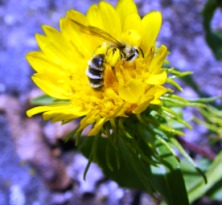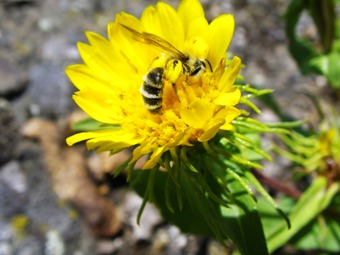— by Russel Barsh —
Wildflower meadows in the islands, including the recovering meadow at Indian Island, pass through successive waves of flowering and insect pollinators each summer.
The first wave, usually lasting for several weeks between mid-April and early June, is dominated by purplish blue Camas (Camassia leichtlinii on Orcas) with accents of red Paintbrush, brown Chocolate Lilies and yellow native Buttercups. Bumblebees feast on Camas, beginning with large unwieldy queens, followed after a week or two by troops of smaller workers.
The second wave is mainly yellow, pink and white, beginning in June when Camas and Chocolate Lily seedpods are ripening and the days are longer and generally drier. Most conspicuous at Indian Island is Puget Sound Gumweed (Grindelia integrifolia) with its large yellow resinous flowers. Gumweed is an important source of summer food for the island’s pollinators. It continues to flower for two the three months, and its sticky resin is palatable to many insects (including ants and flies) as much as its nectar and pollen.
Bumblebees regard Gumweed as food of last resort in summer, preferring Snowberry and Nootka Rose. But if you wait patiently in a field of Gumweed, you will see another native bee busily drinking nectar and collecting pollen from Gumweed flowers: a Megachilid or Leafcutter bee with a banded abdomen and hairy shoulders.
Leafcutters live in solitary burrows in decaying wood or underground, and line the cells they build for their eggs with neatly trimmed bits of green leaves. The adults nectar, and feed their larvae pollen. They cannot “shiver” to warm themselves, like bumblebees, and travel alone, so they emerge later in the summer and select flowers that bumblebees tend to avoid. They are especially gentle. I have seen a Leafcutter dart off a flower rather than risk a tussle with another bee, or even a tiny ant or beetle.
Leafcutters are important pollinators of yellow and white summer flowers, and deserve greater attention and respect.
**If you are reading theOrcasonian for free, thank your fellow islanders. If you would like to support theOrcasonian CLICK HERE to set your modestly-priced, voluntary subscription. Otherwise, no worries; we’re happy to share with you.**










Thank you for this beautiful and informative article!